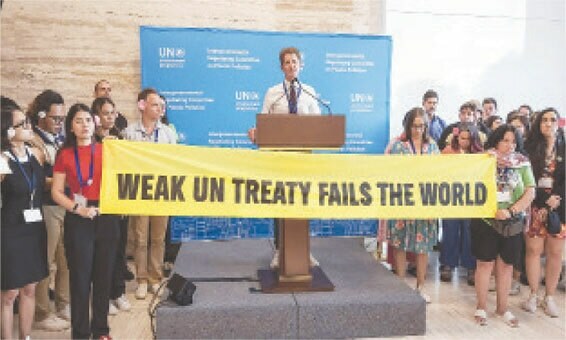KARACHI: The 10-day negotiations towards a legally binding agreement to tackle global plastic pollution fell apart on Friday, a couple of days after the first draft of the treaty was rejected by 80 countries.
The new iteration, which was to be shared on Thursday, was adjourned in 43 seconds. It took another 16 hours for the plenary to be reconvened.
Talks chair Luis Vayas Valdivieso said the session had merely been adjourned rather than ended.
He told AFP that countries and the secretariat “will be working to try to find a date and also a place” for resuming the talks.
However, the process was a shambles, with many delegates being excluded from the final plenary.
Talks break down after most countries reject initial draft; Musadik Malik says text offers no clarity on financing or access to tech
“We remained outside the convention centre well after past midnight on Thursday, expecting the final plenary to take place, only to be told it would reconvene the following morning, without any indication of time.
Then suddenly, they rushed it through at 6am on Friday“ Climate Change Minister Dr Musadik Malik told Dawn from Geneva.
He called the uncertainty deliberate; “it was designed so no one had time to read the revised text, reflect on it and analyse it properly.”
As negotiators took the floor, the room echoed with familiar rhetoric and recycled talking points.
Despite expressions of disappointment over unmet ambitions and underwhelming outcomes, there was broad consensus on one thing: plastic pollution remains a grave and escalating threat to both people and the planet.
The High Ambition Coalition, which includes the European Union, Britain and Canada, and many African and Latin American countries, wanted to see language on reducing plastic production and the phasing out of toxic chemicals used in plastics.
The cluster of mostly oil-producing states calling themselves the Like-Minded Group — including Saudi Arabia, Kuwait, Russia, Iran, and Malaysia — want a much narrower remit.
Hopeful
Still, many remained hopeful. Vietnam was heard saying: “It’s (the treaty) within our grasp”, while Sri Lanka found the new text “an improvement” from the one shared a day earlier.
Madagascar said countries needed to act “boldly and with strong political will” as did Tunisia calling for a more “courageous decision” from the countries.
But there were some who were brave enough to openly reject the second iteration too.
“We’ve been ignored in the treaty,” said the delegate from Paraguay, speaking on behalf of the land-locked developing countries (LLDCs).
She asserted that measuring them with the same yardstick as the plastic polluters was a “tremendous injustice” as they polluted the oceans the least, and announced her bloc was “rejecting” the second iteration of the treaty.
Pakistan criticised the process, finding it lacking transparency.
“There was a general sense among developing nations, including us, that they were sidelined. There was no clarity on financing nor on whether polluters would grant us access to technology. To me, even the language implied ‘you’re on your own’,” Dr Malik said of the earlier version that was shared by the organisers on Wednesday and quickly taken back.
“We were willing to meet them halfway, even take a few steps back to find common ground,” he said.
Break Free From Plastic, a global coalition of over 13,000 groups and individuals, said the talks had been “captured by the petrochemical industry.”
Despite the concerns raised by various developing nations, calling for stricter controls on plastic waste, progress remained elusive.
Subsequently, Friday’s meeting also ended without a clear agreement on the path forward.
For Dharmesh Shah — consulting senior campaigner on the Plastics Treaty at the Centre for International Environmental Law — it felt like “Busan all over again” having witnessed all the five previous rounds of negotiations.
“Better to continue talking than to go home with a bad agreement in hand,” he told Dawn over the phone from Geneva.
Published in Dawn, August 16th, 2025
